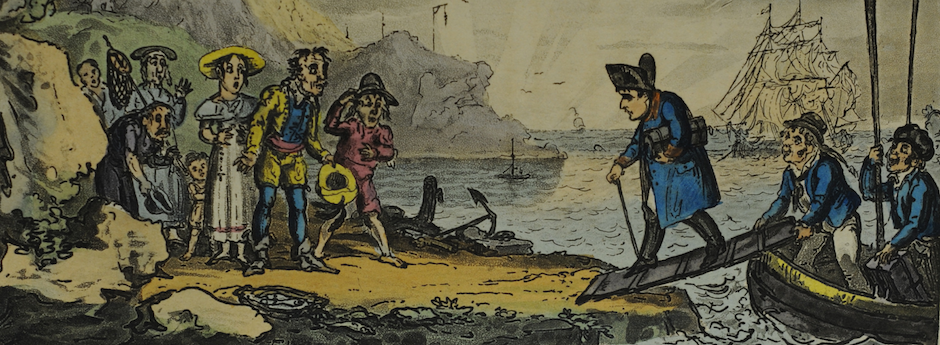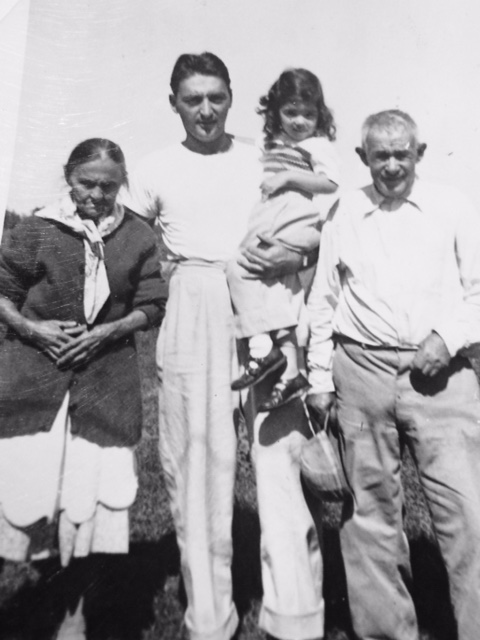Author’s Note: This post is for my cousin, Raymond Saunders. Thanks, Ray, for putting it all together.
With all due respect to Isaak Dinesen, my paternal great-grandparents had a farm- in Michigan. It was not a coffee plantation in Kenya- like her famous one. And I do not come from a wealthy, Danish Unitarian merchant family as she did. But the farm I just visited last Sunday has a history that is just as remarkable.
Around 1897, during the second presidential term of Grover Cleveland, powerful and patrician Massachusetts Senator Henry Cabot Lodge introduced a bill that forbade immigration to any person who could not read and write in his native language. The bill passed easily through the Senate, and despite the strenuous objections of John “Honey Fitz” Fitzgerald on the House of Representative’s side of things, it passed there as well.
The future mayor of Boston (and future grandfather of President and namesake, John Fitzgerald Kennedy- as if you needed to be told) took his case straight to the top. With all the charm and luck of the Irish, he persuaded President Cleveland to veto that bill.
Lucky for me that he did.
My paternal great-grandparents were illiterate in Russian. They were only fluent in Yiddish- kind of the poor step-child of German.
And it was no wonder because they both hailed from a little village which originally had been a part of Poland. Then, in the eighteenth century, the village became part of the Russian Empire. Then, as part of the Eastern Front, it was alternately occupied by the Russians and the Germans.
Finally, during World War II, the Nazis lined up all the village’s remaining Jews, shot them and buried them in a mass grave.
Gottenyu! Oy vey iz mir!
All I can say is, thank God, my great-grandfather, a penniless shoemaker, hightailed it out of there in 1907. His daughter- my father’s mother- followed him in 1909. And his wife- and three of their sons- pulled up the rear.
(The one son who didn’t come to America was… well, see above.)
Back in the old country, Great-Grandfather was a shoemaker. And a lousy one. So after another unsuccessful stint at his trade here in Chicago, he pulled up stakes and bought a farm in Michigan.
No one in the family seems to know exactly why he did this. The best guess involves some fancy finagling on the part of the Jewish Agriculture Society who, in order to flimflam poor Jews into purchasing farmland, fronted the $10,00 necessary to buy the sixty acres.
He was a lousy farmer too. Forget the stereotype of the hardworking laborer toiling from dusk ’til dawn, communing and battling with Mother Nature to bring forth bounty from the soil. By all accounts, Great-Grandfather was an easy-going, lovable philosopher, who’s life’s mantra can best be described as “Nu?”*
(*This Yiddish-ism, said with an accompanying shrug of the shoulders, is loosely translated as “So what?’ or “Who cares?” or “It’s no skin off my nose.”)
If eyewitness accounts can be trusted (and my father- as oldest living patriarch of the clan- and three of his cousins can be trusted) Great-Grandpa was a sweet guy with very little knack for grass-cutting, cattle prodding, tinkering, furrow-plowing, crop-growing, pest-spraying, chicken-flicking or any other skill vitally needed to run a farm.
This came as no surprise to Great-Grandfather. He himself hated the place and called it the “farshstunken farm. ” (This is aristocratic Danish for “lousy, stinking farm.”)
He did like to bend an elbow- or two. We heard an awful lot about a local tavern he visited on occasion. (Much to his disapproving wife’s chagrin. Family lore has it that when she would scold him for stopping in, he’d say that his old-even-then Model T drove him there.)
Great-Grandmother was a horse of a very different color. She weighed about eighty pounds. And she never stopped working. Stern, severe, weather-beaten- with a face as lined as Georgia O’Keefe’s. I remember her, and as a child, I always thought that she was an Indian.
Even today, when I see photographs of her, they could have been taken by Edward Curtis. (Although today I recognize my very own nose among all her wrinkles.)
And later in life, my notion that she was a Native American would not be disabused when my father would take me to visit her. She spoke Navaho! (It was only much later that I realized that it was Yiddish.)
How my father loved there two characters. And how they loved him- and all their children and grandchilden and nieces and nephews and friends and friends of friends who would visit them year after year on their farm.
So many happy summer memories, as my dad would leave the hot city behind and make his way to South Haven. And though the place was really rundown (“A dump!” my father exclaimed on the nifty videotape made to capture golden memories of the farm and its occupants) he LOVED it there.
There was no indoor plumbing, electricity or running water.
But there was blueberry picking and sleepovers in the hayloft and card games galore.
And when people came from all over the world last Sunday to ride a bus from Chicago to visit those sixty, hard-scrabble, weedy, crop-less, building-less acres for an afternoon and share reminiscences about the happy times they spent there, it would take a storyteller with Isaak Dinesen’s gift to properly put their emotions into words.
My ancestors may have been lousy farmers but the family they started now includes lawyers and doctors and businessmen, an actor, a chef, a mobile app developer, a professor at Stanford, a much-honored English teacher at the University of Chicago Lab School, a teacher at Francis Parker, a teacher at a private school in Boston, a blogger.
All this sprung from two illiterate people Henry Cabot Lodge thought should never set foot on his land.
My great-grandparents raised generations of successful people on that little farm in Michigan.
And the cash crop was love.



WONDERFUL. UNFORTUNATELY MY MOTHER’S PARENTS WERE FROM A SPOT IN GERMANY OR POLAND, ACCORDING TO HER IT DEPENDED ON WHICH DAY OF THE WEEK IT WAS, AND THE SAME FOR DAD’S PARENTS. ON MOTHER’S SIDE WAS A TAILOR WHO’S CLAIM TO FAME WAS A HIDING PLACE FOR THE WEST SIDE JEWISH MAFIA. THEY WOULD RUN INTO HIS SHOP AND CRAWL UNDER THE TABLE CLOTH COVERS. ON MY DAD’S SIDE WASN’T MUCH BETTER. HE “RETIRED” AT THE AGE OF THIRTY FIVE, A NON SUCCESSFUL “REAL ESTATE” MAN AND LET HIS FIVE SONS SUPPORT HIM. AS YOU MENTIONED THE RESULTS FOR THE OFFSPRING WERE PRETTY GOOD, NOT AS SUBSTANTIAL AS YOURS, BUT ACCOMPLISHED IN MANY MANY WAYS. IT’S TRULY WONDERFUL, GREAT MEMORIES. THANKS A MIL. ALLAN
Thank you for sharing your story, Allan. I’d like to think that this is everybody’s story- not just our family. This is America’s greatest strength- that anyone can become anything. Where you were born, on the money ladder, does not determine your fate. And unless your name is Sitting Bull, this story of immigration and tenacity is just about universal. Thanks again.
Wonderfully written, Ellen. I was there, inspired, awed, and heartened. Your descriptions were spot on and very accurate. Times change, financial situations change, and locations change. But our human needs, and our connections don’t change. This family reunion was fantastic! Hope we can do more in the future.
Thank you for this beautiful observation, Yale. And I like to think that this is more than just our story; it’s every family saga.
I vote for more reunions, too. Maybe we can all make a pilgrimage to Drake Avenue? Kenny remembers when you and Howard used to tell him that the TB sanitarium was the nuthouse!
Ellen,
I think your assessment of Lodge is a little skewed.
Here are some more facts:
In 1890, Lodge co-authored “The Federal Elections Bill” that guaranteed federal protection for Black’s voting rights. Although the proposed legislation was supported by Pres. Harrison, the bill was blocked by filibustering DEMOCRATS.
Yes, he was a supporter of immigration restrictions but not to the extent that you described. Yes, he proposed to LIMIT further immigration, particularly those of low education and skills in order to more efficiently assimilate the millions that have already come.
Lodge was also quoted as saying, “Let every man honor and love his place of birth and race from which he springs. But, let us have done with hyphenated Americans and ALL BE AMERICANS (just as my grandparents and your grandparents did). If a man is going to be an American at all, he went on, let him be without any qualifying adjectives. And, if he is going to be something else, let him drop the word ‘American’ from his personal description”. (Again, just as my grandparents and yours did).
Lodge NEVER proposed that certain people should EVER step foot in America.
Yes, we are both lucky that our grandparents were able to get here. But, at the same time, Lodge is not as bad a man as some portray him to be!
Bernie, thank you for the history lesson, buddy. It’s longer than the post but I appreciate the correction. I was going off the data I had but I bow to your superior knowledge in the matter. In fact, I’m glad to know it because my daughter lives in Boston- land of Lodge.
You put a lot of work into this one. Thanks, Bernie.